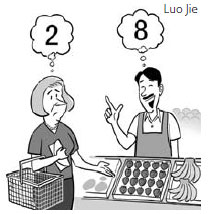The big strawberries on the Beijing market remind me of my first spring here back in 1991. These dark red fruits of different shapes and sizes made my mouth water, and I thought of making several jars of short-cooking and low-sugar strawberries. The strawberry man put up his thumb and index finger as if raising a pistol at me. "Only 2 mao (0.2 yuan)," I thought, and asked for 10 jin (5 kg), taking 2 yuan from my wallet.
Handing me the big bag, the man said: "Ba kuai (8 yuan)." I was surprised, but then remembered that raising these two fingers resemble the Chinese written character "8", while for us Italians they indicate "2".
One can learn a language in a classroom, but no textbook can ever teach social and cultural nuances the way experience does.
The first time I wanted to buy eggs, my skills in Chinese were still up to only "ni hao" (hello) and "xie xie" (thank you). So, I pointed at some eggs in a box and asked for "yi jin".
Once at home, when I tried to crack the eggs, I was surprised at how resistant they were. In fact, what I had bought were salted preserved duck eggs - xian ya dan, a delicacy that I had never heard of.
Another day, I went to the market and bought some you cai (a kind of cabbage). The merchant used his fingers to indicate "3" as they often do with foreigners, presuming we don't speak Chinese. I gave him 3 yuan and left. He smiled, said something I didn't understood, then turned to the other vendors and they all laughed together. Only several days later did I realize that I had paid 10 times too much: He had meant 3 mao (0.3 yuan).
I once bought something that I believed was ginger. The peasant put several pieces on the scale, but I wanted only one. He stared at me, wondering whether I was joking, and started to laugh. The others came over and he told them that the lao wai (foreigner) wanted only one piece. What was so funny?
one. He stared at me, wondering whether I was joking, and started to laugh. The others came over and he told them that the lao wai (foreigner) wanted only one piece. What was so funny?
Surrounding me, they asked: "Ni shi bu shi meiguo ren?" (Are you American?). Could the Americans buy a single piece but not the other nationalities, I wondered?
As I insisted, they consulted amongst themselves, finally deciding to charge me "2 mao". Once at home, I realized that the ginger had no odor at all: What I had bought was a kind of small, wild potato.
Another experience that taught me a good lesson involved rice. In the early 1990s, ration coupons were still necessary for staples such as cereals (including bread, cookies), oil and meat.
Not being a Chinese with a Beijing hukou (residence permit), I had no tickets, but my students gave me some as they ate at the university cafeteria. But at the State-owned grain store, the woman wouldn't sell me the rice. She tried to explain something that I guessed was "Where did you get these tickets? You are not Chinese, you can't buy."
I insisted with gestures, in French, Italian and English, but I was talking to a wall. Then, she took me by the sleeve and, as I expected, threw me out. Outside, she pointed at a restaurant across the street. To make it short, once more the mistake was mine. I had asked for "mi fan", which means "steamed rice ready to eat", while she was selling raw rice or "da mi".
Coming to China, I wanted to experience a new life. How could one know the taste of something exotic without taking a bite? That's why I always recommend that newcomers take buses instead of taxis, visit vegetable markets instead of sending their maids to shop for food, and mix with locals instead of sticking with the foreign community.
Mistakes are inevitable and, sure, embarrassing, but they are our best teachers.
(China Daily May 5, 2009)